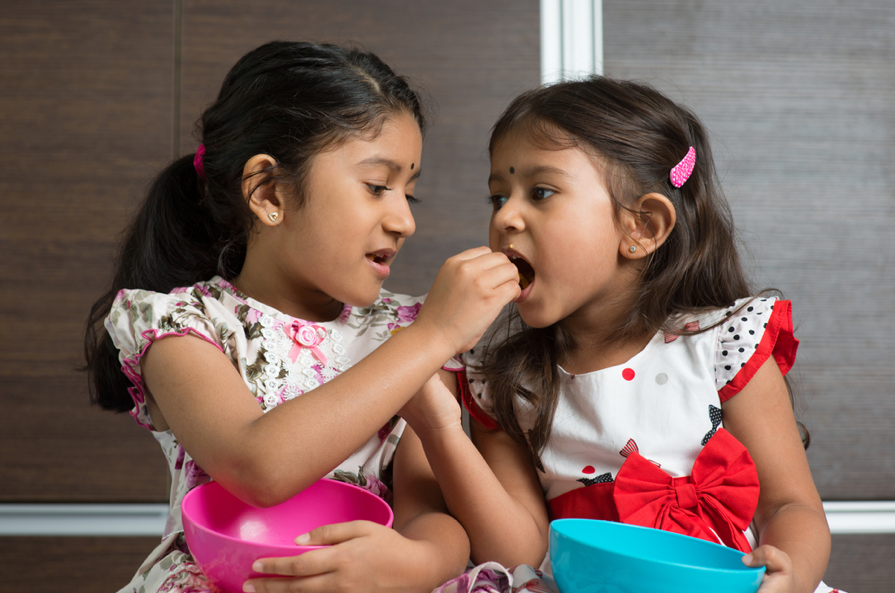Teaching Kids Manners: 22 Things Your Child Can Learn Before They Turn 12

First things first. Disclaimer: there are no perfectly mannered children. There are no perfect parents. If your child is older than 10, and they haven’t mastered the following manners, that’s ok. You’re here and it’s never too late for them to learn. Naturally, the sooner the better but this isn’t about parent shaming. It’s about kids and parents learning as we go.
And remember this: there are thousands of books about parenting and child development. There isn’t, however, a book on your child. You and they began writing that book the moment your child was born. Take a nice long exhale and let yourself off of any hook you think you should be on. You likely don’t belong there. Onward.
As parents, we want to raise our kids to be good and kind human beings. We want to know when they go out into the world that they are liked and that they can get along well with others. One of the ways to ensure this is for kids to have good manners. With September being National Children Good Manners Month, there’s no better time to brush up on our P’s and Q’s and reinforce these good manners at home.
Why manners are important for young children to learn
Manners teach us how to get along with others and without them, society would be a free-for-all of rude people eating with their hands and mouths gaping open. That may be going a bit far, but Emily Post said, “Manners are a sensitive awareness of the feelings of others. If you have that awareness, you have good manners, no matter what fork you use.”
Now this doesn’t mean that you need to teach proper place settings at the dinner table or that your child has to be well-behaved all the time. As parents, we know that’s next to impossible! However, manners aren’t just for special occasions and holiday events with extended family.
At the core, good manners are about respect for oneself and others. Saying “please” acknowledges a person’s right not to do what you ask and it’s not such a demand with a “please” attached. A “thank you” extends appreciation to another. Kids can also learn about responsibility and kindness when using manners.
From making (and keeping) friends to school teachers and future employers, having good manners goes a long way and is a lifelong habit that starts early.
It’s part of what makes a good first impression and a memorable one.
We know that children are like sponges and they emulate what they see at home. Instilling good manners starts with you. The most important thing is to be consistent and live by example. Good manners start at an early age and once bad habits form it’s often more challenging to change them.
Here are 22 examples of good manners for your kid to master before they turn 12 years old.
1. Teach first manners beyond the magic words. Of course, you’re teaching your toddler “please” and “thank you,” but instilling additional ones like “excuse me” for burbs and other bodily noises and “you’re welcome” shows awareness, kindness, and respect. This is also a good time to start teaching “I’m sorry” when wrongdoings occur.
2. Let your toddler set the table. Toddlers like to be helpful, so this is a good time to have them hand you their cup when they are finished after a meal, which helps set the expectation of clearing the table when they are older. You can also have them help set the table with napkins and kid-friendly silverware.
3. Practice the “golden rule.” Around the age of 3 and into elementary school years, kids are becoming more social and it’s important to teach them how to get along well with others. Playing with toys and games creates a rich learning environment about taking turns, playing fair, and sharing.
This is where the “golden rule” (do unto others as they would be done unto you) is a great teaching tool and is repeated often. It’s key to developing a sense of awareness of others and their feelings when you can pause and reflect on a situation that didn’t go favorably.
4. Be a good guest by thanking and saying goodbye to the parent and friend who had them over for a playdate or sleepover.
5. Help clean up when playtime is over. Setting this standard both in your home when friends come over to play, but also emphasizing it when you pick your child up at a friend’s house will make it seem like that’s just what you do. And guess who will be the most invited kid on the block?
6. Ask permission when in doubt. Bonus points if it’s accompanied with “May I?…” This can range from “May I go out to play?” to “Can I have this popsicle?” to “Is it ok to use this knife?” Start this one early!
7. Do not interrupt others when speaking. All too often kids think that the world revolves around them and that they should be the center of attention. Now. How about now? And now. When your child interrupts your conversation, please excuse their behavior and let them know that it is inappropriate. It’s important that they learn conversational turn-taking and patience. It may be important to refer to the golden rule above.
8. Properly enter a conversation. There are appropriate times to interrupt a conversation, but know when and how to enter a conversation with, “Excuse me…” It’s very possible someone needs to go to the restroom or someone got hurt and needs a parent’s attention.
9. Ask to help set the table and clear the table at mealtimes. We can all use a little help in the kitchen and this is one way of working together to make a meal happen.
10. Knock on closed doors and wait to hear if you’re invited in. It’s important to teach children to respect privacy from time in the bathroom to being left alone in a room (or when parents want to be alone!). Again, this is one where the golden rule may also be applicable.
11. If you accidentally bump into someone, say “Excuse me.” Accidents happen, but not apologizing or excusing yourself is rude.
12. Do not hit, make fun of others or call others names when mad or frustrated. Especially when your children are young, get them to start expressing their feelings and teach them to talk their feeling through and release them rather than bottling them up and acting out. This is good manners and appropriate behavior that are important at any age! And it’s never too late to start.
13. Do not comment on someone’s physical characteristics unless it’s to offer a compliment. Otherwise, it can be rude and hurtful. This is reinforcing respect and kindness for people’s differences.
14. Look someone in the eye when they are talking to you. In this digital day and age when so many of us are glued to our devices, this one may take some time. However, start early so that by the time your child has their own phone, it won’t be an issue.

15. Know how to greet someone graciously. This one can be a challenge, especially for shy children (and adults!). Your child is going to make 100,000 first impressions, so it’s good to start teaching gracious greetings early so that they can become more comfortable with this over time. Let your child know what your expectations are and demonstrate how it feels when someone looks away when role-playing an introduction.
The important parts of gracious greetings are:
- Smile!
- Shake hands confidently
- Clearly say, “My name is….”
- Bonus points: introducing others that are within earshot of the conversation
- Excuse yourself if not staying for the conversation
16. When you walk through a door, see if you can hold it open it for someone else. Or better yet, move forward quickly to hold the door open for a friend, loved one, or someone that clearly needs help. This demonstrates thoughtfulness and kindness.
17. Respect together time. This one is also quite a challenge during this digital age. At some point, you will decide when it’s best for your child to have a cell phone. But once you do, it can be so hard to remove that glowing little box from their hands! So be sure to set up some house rules about what’s going to work and not work under your roof. Then the tough part can be enforcing those rules yourself!
It’s not uncommon these days to be alone together or sitting side-by-side using our phones. Without a conscious effort, your together time and family time will fly right out the window. It may be important to create “electronic free time” and institute a “no cell phones at the table” rule so that you actually have some time interacting, talking, and looking at each other’s eyes. I wrote another blog post about this that you may find helpful, particularly with your family members.
18. Have table manners. It’s practically a lost art, but there are so many things to demonstrate including:
- Place your napkin on your lap
- Keep elbows off the table
- Know how to have (and what is) a respectful dinner conversation
- Wait for others to be served before eating
- Ask to pass the food instead of reaching over the table to get it
- Do not get up until everyone is finished
- Excuse yourself before leaving the table
These were once commonplace manners in generations past. But with today’s busy family lifestyles getting at least one meal a week together, especially as kids get older, can become a treasured time.
19. Participate in household responsibilities. When kids have chores, it teaches them to be respectful of their own space inside their rooms and be helpful within their home. This will translate well when going to friends’ homes and their space at school and eventually at work. Recent research also suggests that chores build character, develop confidence and self-discipline, and create a sense of pride in children who do them.
20. Learn polite phone etiquette. Removing cell phones and devices during dinner and family time shows that you respect and care about your time with loved ones.
21. Know how to apologize well. Especially as kids get older, it can be a challenge to take responsibility for their actions and to properly make amends for their mistakes.
22. Express gratitude. When kids don’t pause to express their gratitude for the things they have been given (from gifts to experiences to food in the refrigerator) they think that’s just the way it is, and it can develop into entitlement.

Take a few moments and ask yourself this: What would I like to add to this list? What is important to you? You can ask yourself, what annoys you about other people’s children that you want your kids to learn?
Teaching manners is a group project!
Remember, this isn’t all on you. There are other significant adults in their lives who can also teach and demonstrate good manners. Enlist grandparents, extended family, and teachers to support your efforts and reinforce these learned behaviors.
Additional resources for you
Another popular way to instill manners in kids is to read books that reinforce good behavior. This is particularly important when they are young. It’s an opportunity for fun and a good way to remind them when out in public. Examples of these fun books are:
• Rules of the Wild: An Unruly Book of Manners by Bridget Levin
• My Mouth is a Volcano by Julia Cook
• Do Unto Otters: A Book About Manners by Laurie Keller
• Time to Say “Please”! by Mo Willems
• How Do Dinosaurs Eat Their Food? by Jane Yolen
I hope that this article has been helpful to you as a parent and, ultimately, to your children. As a former school teacher, a marriage and family therapist, and the father of three, I would like to invite you to contact me if you would like to learn more about these and other great life skills for your child. I would be happy to offer you a free 15-minute phone consultation.


















